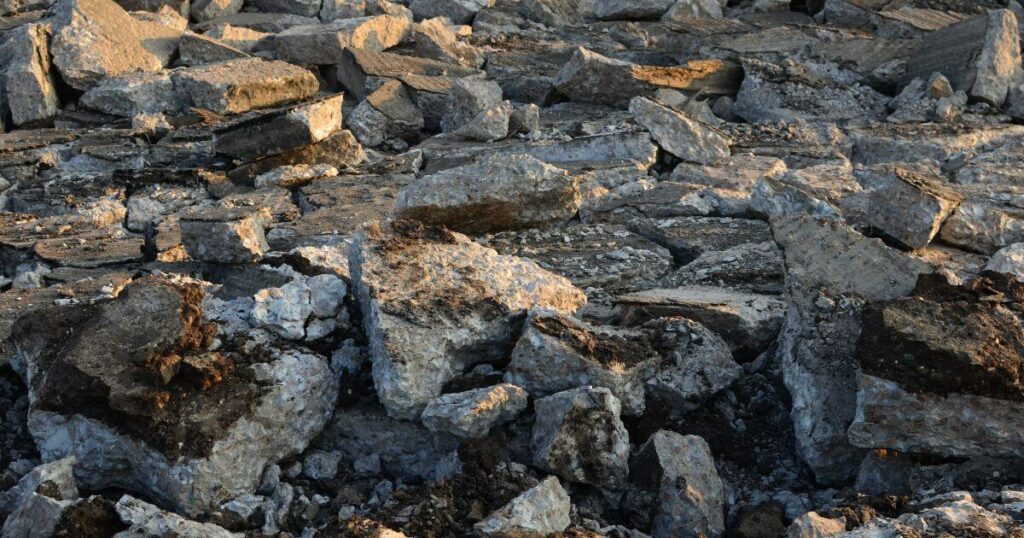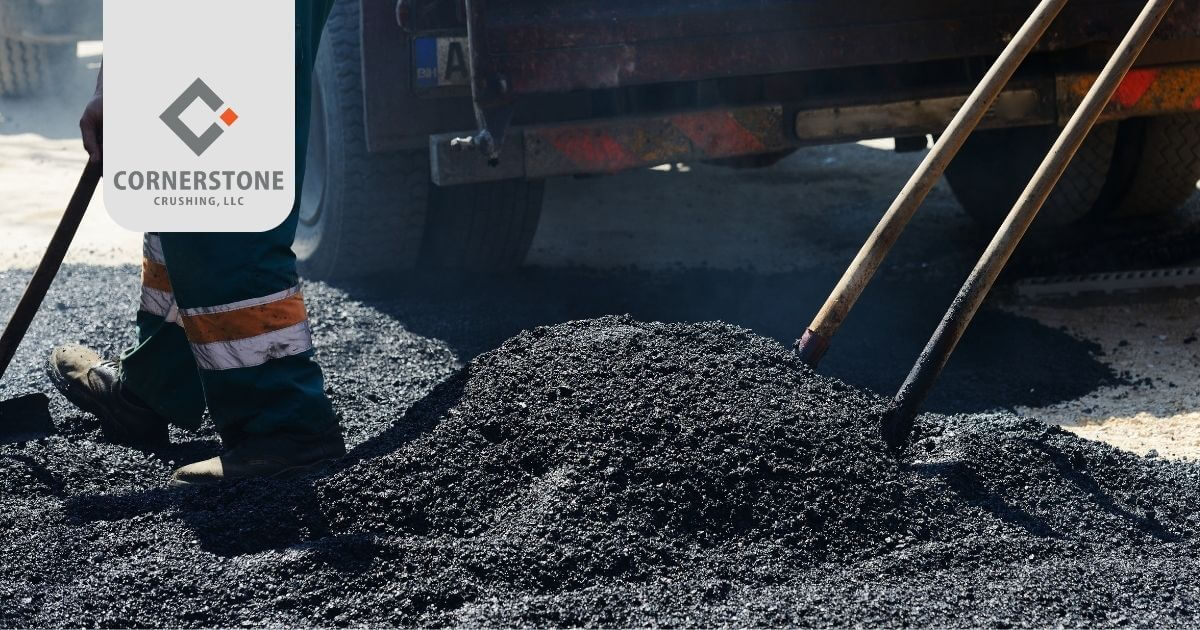Mobile asphalt crushers are at the forefront of modern construction and recycling, offering a dynamic solution to managing pavement materials in an eco-friendly and cost-effective manner. These machines, like those provided by Cornerstone Crushing, adeptly convert discarded asphalt into high-quality aggregate, ready for reuse in new projects. By doing so, they not only reduce waste and associated disposal costs but also pave the way for sustainable construction practices that are increasingly demanded by both regulations and a global push towards environmental responsibility. Through a combination of crushing and screening, mobile asphalt crushers ensure that valuable resources are retained within the construction cycle, promoting efficiency and sustainability in infrastructure development.
What is a mobile asphalt crusher?
A mobile asphalt crusher is a specialized piece of equipment designed to reduce large chunks of asphalt into smaller, more manageable pieces for recycling and reuse in construction projects. These crushers are portable, allowing them to be transported to various construction sites where old pavement materials can be processed on-site. This capability not only saves on transport costs but also speeds up the recycling process. Mobile asphalt crushers come in various types, including jaw, impact, and cone crushers, each suited for different stages of the crushing process. They are an integral tool in modern road construction, promoting efficiency, sustainability, and cost-effectiveness by turning waste materials into valuable resources.
Why are mobile asphalt crushers important?
Mobile asphalt crushers are pivotal in recycling old pavement, significantly reducing waste and associated costs. These machines are crucial for sustainable road construction practices, aligning with global efforts to minimize the environmental impact. By transforming discarded asphalt into reusable materials, these crushers conserve natural resources and reduce the need for new raw materials. Their portability and efficiency enable on-site processing, which not only cuts down on transportation emissions but also speeds up project timelines. In essence, mobile asphalt crushers are key to building greener, more cost-effective infrastructure.
Recycle old pavement, reducing waste and costs
Mobile asphalt crushers play a vital role in recycling old pavement, transforming potential waste into valuable construction material. This recycling process significantly reduces waste and associated costs, both from disposal fees and the expense of new material acquisition. By enabling on-site repurposing of asphalt, these machines eliminate the need for transporting materials to recycling centers, further reducing costs and emissions. The capability to recycle pavement directly at construction sites represents a significant advancement in efficient and cost-effective construction practices.

Essential for sustainable road construction practices
The integration of mobile asphalt crushers is crucial for sustainable road construction. They facilitate the industry’s move towards more environmentally friendly practices by maximizing the reuse of materials. This approach not only conserves natural resources but also minimizes the carbon footprint associated with the extraction and processing of new materials. Moreover, by encouraging recycling and minimizing landfill waste, mobile crushers play a key role in promoting a circular economy within the construction sector. Their importance in sustainable road construction is growing ever more critical as global environmental standards tighten.
How do mobile asphalt crushers work?
Mobile asphalt crushers function by crushing asphalt into smaller, reusable pieces, suitable for use in new construction and paving projects. These machines operate through a series of mechanical processes, including crushing and screening, to ensure the output material meets specific size and quality requirements. Initially, large chunks of asphalt are fed into the crusher, where they are broken down into smaller fragments. Following this primary crushing phase, the material is passed through screening systems that grade and size the aggregate to match project specifications. This process not only makes efficient use of discarded materials but also significantly enhances the sustainability of construction practices by recycling resources on-site.
Crush asphalt into smaller, reusable pieces
Mobile asphalt crushers excel at transforming large pieces of asphalt into smaller, reusable fragments. This critical process facilitates the recycling of material, making it ready for reuse in a variety of construction projects. By efficiently crushing the asphalt, these machines convert potential waste into a valuable resource, thereby enhancing sustainability and cost-effectiveness in construction endeavors. The capability to repurpose asphalt directly on-site not only mitigates waste but also significantly reduces expenses related to material disposal and procurement.
Include screening systems for material sizing
A vital component of mobile asphalt crushers is their integrated screening systems, which precisely size the crushed material to meet specific project needs. Following the primary crushing stage, the material undergoes screening, where it is separated and graded according to size. This ensures the recycled asphalt aligns with the quality and dimensional requirements for its next application, be it road construction, paving, or other infrastructure projects. The inclusion of sophisticated screening systems elevates the functionality and efficiency of mobile asphalt crushers, solidifying their status as indispensable tools in contemporary construction and recycling processes.
Types of mobile asphalt crushers
Mobile asphalt crushers come in various types, each designed to meet specific crushing needs and stages in the recycling process. Jaw crushers are utilized for primary crushing, effectively breaking down large chunks of asphalt into more manageable sizes. For secondary crushing, impact crushers are employed, which further reduce the size of the asphalt pieces and help in creating a finer aggregate. Lastly, cone crushers are used for fine crushing, refining the material to the desired size and shape for high-quality asphalt recycling. Each type of crusher plays a crucial role in the recycling process, ensuring that asphalt waste is efficiently transformed into usable material for new construction projects.
Jaw crushers for primary crushing
Jaw crushers stand as the frontline solution for primary crushing, adeptly handling the largest chunks of asphalt. These machines excel in breaking down these hefty materials into smaller, more manageable pieces, setting the stage for further processing. Renowned for their robust construction and exceptional crushing capacity, jaw crushers are indispensable for initiating the asphalt recycling process. Their efficiency in the primary stage of crushing ensures materials are aptly prepared for subsequent refinement, crucial for high-quality construction projects.
Impact crushers for secondary crushing
In the secondary crushing phase, impact crushers come into play, skillfully reducing the asphalt pieces to a finer aggregate. These crushers leverage forceful impacts to break down materials, often achieving a more consistent particle size. This feature is particularly beneficial for meeting the precise quality standards required in sustainable construction. Impact crushers’ ability to produce uniformly sized materials makes them a pivotal component in the asphalt recycling chain, ensuring the production of high-standard materials for construction.
Cone crushers for fine crushing
Completing the crushing process, cone crushers are employed for fine crushing, meticulously refining the asphalt to its desired size and shape. Through a combination of compressive forces exerted by an eccentrically rotating cone and a fixed crushing throat, these crushers ensure the material meets the exact specifications for top-tier asphalt recycling. The operation of cone crushers not only elevates the quality of the end product but also bolsters the overall efficiency of the recycling endeavor. This stage is crucial for generating premium recycled asphalt, ready for incorporation into new construction projects.
Key features in mobile asphalt crushers
Mobile asphalt crushers are distinguished by several key features that amplify their efficiency, durability, and performance in recycling tasks. A fundamental trait is their portability, which permits these crushers to be effortlessly moved to various construction sites, enabling on-site recycling of asphalt materials. This mobility significantly slashes transportation costs and reduces the environmental footprint. Another vital characteristic is their high crushing capacity, which allows for the processing of large volumes of material efficiently, guaranteeing a consistent supply of recycled aggregate for construction endeavors. Moreover, these machines boast low maintenance needs, thanks to their durable construction designed to endure the demands of crushing operations while minimizing downtime. Collectively, these features position mobile asphalt crushers as invaluable tools in contemporary construction and recycling operations, fostering more sustainable and cost-efficient practices.
Portability for easy transportation
A pivotal attribute of mobile asphalt crushers is their portability, which significantly eases transportation to diverse job sites. This feature is indispensable for facilitating on-site recycling of asphalt, dramatically reducing the necessity for material transport and, consequently, lowering both costs and the environmental footprint. The flexibility to relocate these crushers as required boosts operational adaptability and efficiency, rendering them a vital asset in contemporary construction endeavors.
High crushing capacity and efficiency
Engineered with high crushing capacity and efficiency, mobile asphalt crushers excel in processing large volumes of material swiftly. This high throughput ensures a continuous supply of recycled asphalt aggregate, primed for integration into new construction projects. The efficiency of these machines not only accelerates the recycling process but also augments the overall productivity of construction operations, satisfying the demand for premium recycled materials.
Durable construction, low maintenance
Durable construction underscores the design of mobile asphalt crushers, equipping them to endure the demands of heavy-duty operations. This robustness leads to low maintenance needs, facilitating uninterrupted work with minimal downtime. The durability and dependability of these machines reduce operational costs over time, positioning them as a cost-effective solution for entities aiming to bolster their recycling and construction capabilities sustainably.
Environmental benefits of mobile crushers
Mobile crushers present significant environmental benefits, chiefly through the reduction of landfill waste. By efficiently recycling asphalt on-site, these machines transform potential waste into valuable construction materials, markedly decreasing the amount of material destined for landfills. This not only conserves valuable landfill space but also mitigates the environmental repercussions associated with waste disposal. Moreover, mobile crushers play a pivotal role in the conservation of natural resources by diminishing the necessity for new raw materials. The utilization of recycled asphalt reduces the demand for quarrying, mining, and processing fresh materials, thus preserving natural habitats and lowering carbon emissions. Lastly, the lower carbon footprint associated with mobile crushing methods, in comparison to traditional material processing and transportation, highlights their contribution to sustainable construction practices. Through these efforts, mobile crushers are instrumental in promoting environmental sustainability within the construction sector.
Significant reduction in landfill waste
Mobile crushers play a pivotal role in significantly reducing landfill waste by enabling the recycling of asphalt directly on construction sites. This transformation of potential waste into valuable resources drastically cuts down the volume of material destined for landfills. Such a reduction not only conserves valuable landfill space but also minimizes the environmental impacts associated with waste disposal. By promoting on-site recycling, mobile crushers ensure a more sustainable management of materials, contributing to a more environmentally friendly construction industry.
Conservation of natural resources
Utilizing mobile crushers is key to the conservation of natural resources. Recycling existing asphalt diminishes the demand for new raw materials, thereby reducing the need for resource-intensive quarrying, mining, and processing activities. This conservation effort helps protect natural habitats, preserve biodiversity, and align construction practices with sustainability goals. Through the efficient reuse of materials, mobile crushers aid in safeguarding our planet’s natural resources for future generations.
Lower carbon footprint than traditional methods
Opting for mobile crushers results in a lower carbon footprint when compared to conventional material processing and transportation methods. The ability to recycle materials on-site eliminates the necessity for long-distance transport to and from recycling facilities, significantly reducing greenhouse gas emissions associated with vehicle transport. Furthermore, the energy-efficient operation of mobile crushers further lowers carbon emissions, positioning them as a more eco-friendly solution for construction waste management. Through these benefits, mobile crushers support the shift towards more sustainable construction practices, underscoring their importance in reducing environmental impact.
Choosing the right mobile asphalt crusher
Selecting the appropriate mobile asphalt crusher is pivotal for optimizing efficiency and achieving the desired outcomes in recycling operations. The decision hinges on the scale of the project and the volume of material to be processed. Key considerations include the material specifications, such as size and hardness, ensuring the crusher is capable of handling the asphalt effectively. The desired output size of the recycled material is also crucial, guiding the choice among jaw, impact, or cone crushers. Compatibility with existing construction equipment further influences the selection, impacting the overall efficiency and cost-effectiveness of the recycling process. By thoroughly assessing these factors, construction professionals can identify a mobile asphalt crusher that aligns with their project’s specific needs, facilitating a successful and sustainable recycling endeavor.
Assess project scale and material volume
A crucial step in choosing the right mobile asphalt crusher involves assessing the scale of the project and the volume of material to be processed. This assessment aids in determining the necessary size and type of crusher to efficiently manage the workload. For larger projects with substantial volumes of asphalt, selecting crushers with a greater capacity and robustness is essential to maintain productivity and reduce downtime.
Material specifications and desired output size
Key to the selection process is understanding the material specifications, such as the asphalt’s size, hardness, and composition. Equally important is defining the desired output size of the recycled material, as this directly influences the choice of crusher type. The specific requirements, whether for finely crushed asphalt for new paving projects or coarser aggregates for base layers, guide the selection to ensure the recycled output aligns with project needs.
Compatibility with existing construction equipment
Ensuring compatibility with existing construction equipment is vital for optimizing the recycling operation. The chosen mobile asphalt crusher should seamlessly integrate with other machinery on-site, enhancing operational efficiency and preventing bottlenecks. This compatibility is crucial for a smooth workflow, contributing significantly to the success and cost-effectiveness of the recycling process.
Challenges with mobile asphalt crushers
While mobile asphalt crushers offer numerous advantages for recycling and construction projects, they also come with their set of challenges. Noise and dust pollution are significant concerns, especially in areas close to urban or residential zones, requiring effective mitigation strategies to minimize their impact. Additionally, navigating regulatory compliance and permits presents a complexity, as environmental and safety standards differ across locations and must be adhered to ensure operations do not negatively affect the surrounding community or environment. Furthermore, the high initial and operating costs associated with mobile crushers necessitate thorough financial planning. The investment in these machines needs to be balanced against the potential savings from reduced material and disposal costs, alongside the environmental benefits of recycling asphalt. Overcoming these challenges is essential for optimizing the efficiency and sustainability of mobile asphalt crushing operations.
Managing noise and dust pollution
Managing noise and dust pollution emerges as a pivotal challenge in the operation of mobile asphalt crushers. The generation of significant noise and dust can impact not only the immediate environment but also nearby residential communities. Employing dust suppression methods, such as water sprays, and implementing noise reduction measures, including acoustic barriers, are essential steps to minimize these environmental impacts. Additionally, scheduling operations during less sensitive times can further mitigate disturbances, underscoring the importance of effective pollution management in asphalt recycling endeavors.
Navigating regulatory compliance and permits
Navigating regulatory compliance and permits demands a comprehensive understanding and strict adherence to a myriad of local, state, and federal regulations. These rules, encompassing environmental protection, safety standards, and zoning laws, can vary widely across different areas. Securing the necessary permits and ensuring compliance is vital to forestall legal complications and penalties. This adherence not only avoids operational disruptions but also reinforces a commitment to responsible and sustainable construction practices, bolstering the project’s standing among stakeholders and the broader community.
Balancing high initial and operating costs
Balancing high initial and operating costs is a critical consideration for entities contemplating the integration of mobile asphalt crushers into their operations. The substantial upfront cost of acquiring these machines, along with ongoing maintenance and operational expenses, requires careful financial planning. Nonetheless, the potential for long-term savings through reduced material and waste disposal costs, coupled with the environmental advantages of recycling, can justify these initial outlays. A detailed financial analysis is imperative to ascertain the economic viability and environmental sustainability of investing in mobile asphalt crushing technology, ensuring its contribution to the success of construction and recycling operations.
Maintaining a mobile asphalt crusher
Maintaining a mobile asphalt crusher is critical for ensuring its longevity and operational efficiency. Regular cleaning is paramount to prevent blockages that can impede performance and lead to downtime. Additionally, the timely replacement of wear parts, such as jaws, liners, and belts, is essential for maintaining high crushing efficiency and prolonging the machine’s lifespan. Equipping operators with training on safety and efficiency is also crucial, as knowledgeable personnel can significantly mitigate the risk of accidents and enhance productivity. Proper maintenance not only helps to minimize operational costs but also ensures the crusher operates at peak performance, thereby supporting the success of recycling and construction initiatives.
Regular cleaning to prevent blockages
Regular cleaning is essential to prevent blockages in a mobile asphalt crusher, ensuring uninterrupted and efficient operation. Debris and remnants from asphalt can accumulate and clog the machinery, leading to reduced performance or even downtime. Establishing a consistent cleaning regimen maintains the crusher in prime working condition, supporting seamless recycling activities.
Timely replacement of wear parts
Maintaining the crusher’s efficiency and extending its service life requires the timely replacement of wear parts. Critical components, such as jaws, liners, and belts, are subject to wear and tear and need regular inspection and replacement. Proactive maintenance prevents unexpected breakdowns and keeps the crusher operating smoothly, maximizing productivity.
Training for operators on safety and efficiency
Training for operators focuses on enhancing safety and efficiency in the use of mobile asphalt crushers. Knowledgeable operators can significantly improve machine productivity by utilizing optimal operating techniques, while also minimizing the risk of workplace accidents. Comprehensive training should include operation best practices, maintenance procedures, and adherence to safety standards, equipping operators to manage the equipment proficiently.

